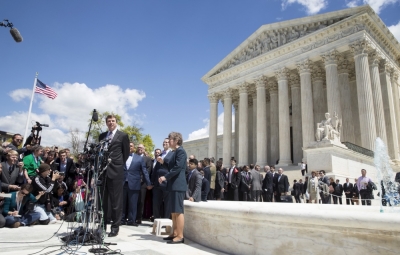Churches: Keep Calm and Carry On After Supreme Court Marriage Decision

As the country awaits the U.S. Supreme Court's decision on whether the Constitution requires states to allow same-sex couples to marry, anxiety escalates among many religious believers, especially conservative Christians. Just last week, South Baptist Convention (SBC) president Ronnie Floyd and 15 other past SBC presidents issued a letter urging all pastors, educators, and other church leaders "to openly reject any mandated legal definition of marriage" that violates biblical standards. Yet a call for civil disobedience is not necessary. The Court will decide what the Constitution requires states to do–not what church leaders must do.
Religious leaders will still have the ability to choose the couples they marry. For example, some ministers currently refuse to marry couples who have not completed premarital counseling, while others opt only to marry couples who are members of their congregations. Even if the Supreme Court requires states to legally permit same-sex couples to wed, religious leaders will retain the right to determine which ceremonies they perform. The Constitution requires the government to be agnostic on such things; the Court's ruling will not change how churches function.
What might change, though, is how marriage operates as a legal and civil institution. In states that permit same-sex unions, homosexual couples enjoy the same rights, privileges, and responsibilities of heterosexual couples. They can adopt and raise children together, jointly own property, receive special tax and pension benefits reserved for spouses and families, and make medical decisions for one another in times of crisis. The government bestows these benefits–not churches.
Undoubtedly, religious believers care deeply about the definition of marriage. They assert the institution reflects God's perfect design and the Bible offers prescriptive guidelines on how marriage should function. Though disconcerting to those who uphold traditional values, the government is not held to the same standard. In fact, the Court declared nearly 140 years ago in Reynolds v. United States (1878) that Mormons could exercise their religious belief in polygamy as a divinely ordained marital institution, but that did not exempt them from laws that prohibited this behavior. Since then, the Court has consistently distinguished between religious belief and religious behavior–and the current fight over how the government defines marriage means that this is not likely to change.
Calls for civil disobedience would only be appropriate if the government criminalized heterosexual unions, for then religious leaders might genuinely claim that that the government's definition of marriage impedes upon their religious conscience. But this will never happen. States will continue to recognize one man-one woman unions even if the Court requires them to also recognize same-sex relationships.
Whatever the outcome, religious leaders should not urge civil disobedience but instead encourage their members to practice intellectual and spiritual hospitality by engaging in constructive discourse with nonbelievers and to focus on faithful personal living. Mormons did this after losing their legal case in 1878 and have made significant gains in culture, business, and politics ever since. Mainstream Christians should do the same.





























